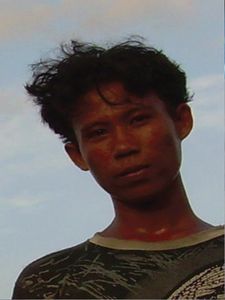 The Betawi people are the original inhabitants of Jakarta. They are often called “people of Jakarta,” “people of Batavia,” or “Betawi.” They are descendents of the people who came to Batavia, (the historical name for Jakarta) in the 15th century. Today, the original Betawi community can be found in areas surrounding Jakarta, such as Pasar Minggu, South Jakarta, East Jakarta, Condet, and Kampung Sawah in Bekasi (West Java Province).
The Betawi people are the original inhabitants of Jakarta. They are often called “people of Jakarta,” “people of Batavia,” or “Betawi.” They are descendents of the people who came to Batavia, (the historical name for Jakarta) in the 15th century. Today, the original Betawi community can be found in areas surrounding Jakarta, such as Pasar Minggu, South Jakarta, East Jakarta, Condet, and Kampung Sawah in Bekasi (West Java Province).
What are their lives like?
In the city of Jakarta, Betawi people work as traders, civil servants, laborers, craftsman, or employees of private companies. In areas surrounding Jakarta, most Betawi people make a living by farming rice, growing fruit, and fishing. Over time, much of the land they have used for rice farming has been sold to become sites for housing complexes, factories, and other facilities required for modernization. As a result, many farmers have sought work in the city, becoming traders or tukang ojek (motorcycle taxi drivers).
It is difficult for the Betawi to be separated from their families. A Betawi person going through financial difficulty can ask for help from his family members and relatives. Because of this practice, outsiders often consider the Betawi lazy in comparison to people of other ethnicities who have more recently settled in Jakarta.
The average level of education in the Betawi community is quite low. A possible reason for this is that the Betawi have identified schooling with the lifestyle of the ethnic Chinese or the colonial Dutch, causing them to reject education. This general resistance to schooling is strengthened by Islamic teachers who have urged the Betawi not to attend government-run schools, but instead to enroll in Islamic schools.
Unique Betawi art forms include lenong (a form of folk theater), ondel-ondel (large puppets used in parades), tari topeng (a form of dance in which the performers wear masks) and wayang golek (shadow theater utilizing wooden puppets). Their traditional form of music is called tanjidor. Sadly, Betawi people themselves rarely perform their traditional art forms anymore.
What are their beliefs?
Daily life in the Betawi community is guided by Islamic teaching and ethics. This can be seen, for example, in the four principles followed by most Betawi. First, they greet one another with the Islamic salutation Assalamualaikum (Peace be to you), to which the answer is Waalaikumsalam (Peace to you too). Second, they pray five times a day. Third, girls must be married as soon as they reach the required minimum age. Fourth, a host must offer his guests hospitality as much as he is able.
The Betawi philosophy for life is “Good fortune is for today; tomorrow is tomorrow’s affair.” They believe that Allah will give them good fortune. Although the Betawi are generally Muslims, they still believe in spirits that inhabit particular places such as trees, bridges, and graveyards.
What are their needs?
The young generation of Betawi need scientific knowledge so that they can adapt to the information era and new technology. Up until now, most lower class Betawi people are still farmers. They would benefit from a wider view on life. The Betawi people will need to become more competitive in order to survive in Jakarta, a metropolitan city in which productivity and efficiency are highly valued.
Leave a Reply